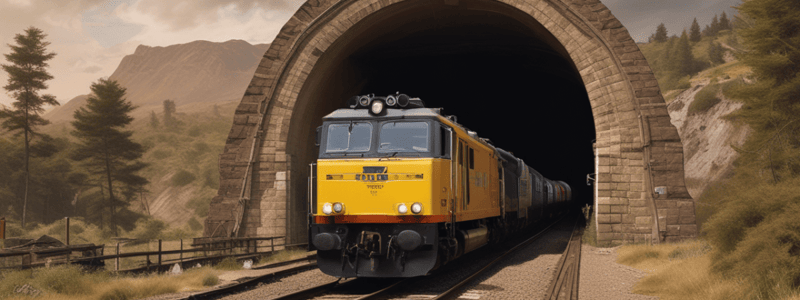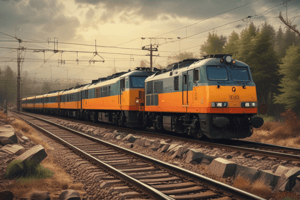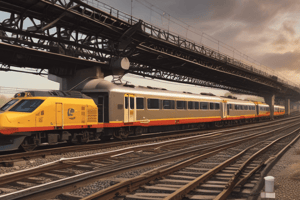Podcast
Questions and Answers
What is the primary purpose of heaping up ballast in the tamping zone?
What is the primary purpose of heaping up ballast in the tamping zone?
- To provide additional clean ballast
- To renew broken sleepers
- To ensure effective packing (correct)
- To make up low cess
What should be done to obstructions such as signal rods, cables, and pipes?
What should be done to obstructions such as signal rods, cables, and pipes?
- They should be ignored by the tamping operator
- They should be adjusted by the JE/SSE/P.Way
- They should be left untouched
- They should be removed preferably (correct)
Why is it important to adjust the tamping depth?
Why is it important to adjust the tamping depth?
- To ensure effective packing
- To provide additional clean ballast
- To make up low cess
- To avoid damage to the sleepers (correct)
What is the recommended adjustment for the gap between the top edge of the tamping blade and the bottom edge of the sleeper?
What is the recommended adjustment for the gap between the top edge of the tamping blade and the bottom edge of the sleeper?
What is the purpose of marking slew, super elevation, and lift value on every second/third sleeper?
What is the purpose of marking slew, super elevation, and lift value on every second/third sleeper?
Why should the tamping tools be inserted centrally between the sleepers into the ballast?
Why should the tamping tools be inserted centrally between the sleepers into the ballast?
What should be done with obstructions that cannot be removed?
What should be done with obstructions that cannot be removed?
What is the recommended temperature range for surface preparation?
What is the recommended temperature range for surface preparation?
How many coats of anti-corrosive bituminous black paint should be applied?
How many coats of anti-corrosive bituminous black paint should be applied?
What should be done to hogged joints before tamping?
What should be done to hogged joints before tamping?
What is the recommended interval between the two coats of paint?
What is the recommended interval between the two coats of paint?
Why is wire brushing done at the end of surface preparation?
Why is wire brushing done at the end of surface preparation?
What should be painted with anti-corrosive black bituminous paint?
What should be painted with anti-corrosive black bituminous paint?
Why should chemical not be used for surface preparation?
Why should chemical not be used for surface preparation?
How often should bituminous painting of rails be done in identified corrosion prone areas?
How often should bituminous painting of rails be done in identified corrosion prone areas?
What should be avoided during surface preparation?
What should be avoided during surface preparation?
What is the primary responsibility of the Sectional JE/SSE P.Way/ (MMG) in the Mobile Maintenance Gang?
What is the primary responsibility of the Sectional JE/SSE P.Way/ (MMG) in the Mobile Maintenance Gang?
What is the name of the vehicle that the Mobile Maintenance Gang is based on?
What is the name of the vehicle that the Mobile Maintenance Gang is based on?
What is the purpose of the dynamic track stabilizers in the On-track Machines Unit (OMU)?
What is the purpose of the dynamic track stabilizers in the On-track Machines Unit (OMU)?
What is the main function of the ballast regulating machines in the On-track Machines Unit (OMU)?
What is the main function of the ballast regulating machines in the On-track Machines Unit (OMU)?
What is the responsibility of the Sectional Gangs in the track maintenance?
What is the responsibility of the Sectional Gangs in the track maintenance?
What is the purpose of the shoulder ballast cleaning machines in the On-track Machines Unit (OMU)?
What is the purpose of the shoulder ballast cleaning machines in the On-track Machines Unit (OMU)?
What is the jurisdiction of the Mobile Maintenance Gang in a single line section?
What is the jurisdiction of the Mobile Maintenance Gang in a single line section?
What is the primary purpose of the UTV in the On-track Machines Unit (OMU)?
What is the primary purpose of the UTV in the On-track Machines Unit (OMU)?
What is the code for a foot transverse break at the rail seat?
What is the code for a foot transverse break at the rail seat?
What is the procedure for sending samples for metallurgical investigation in case of a fractured rail?
What is the procedure for sending samples for metallurgical investigation in case of a fractured rail?
What is the purpose of protecting the fractured faces with mineral jelly and hessian cloth?
What is the purpose of protecting the fractured faces with mineral jelly and hessian cloth?
What is the code for an internal flaw in the head with a transverse breakage?
What is the code for an internal flaw in the head with a transverse breakage?
Who receives a copy of the metallurgical investigation report?
Who receives a copy of the metallurgical investigation report?
What is the purpose of sending a rail failure report with the sample?
What is the purpose of sending a rail failure report with the sample?
What is the code for a foot vertical longitudinal crack?
What is the code for a foot vertical longitudinal crack?
What is the length of the rail piece that should be sent for metallurgical investigation?
What is the length of the rail piece that should be sent for metallurgical investigation?
Under whose supervision should the work of deep screening be done?
Under whose supervision should the work of deep screening be done?
What should be predetermined before starting the deep screening operation?
What should be predetermined before starting the deep screening operation?
In which direction should the deep screening work proceed on a double line?
In which direction should the deep screening work proceed on a double line?
What is the purpose of removing the ballast from space 'A' and 'B' in Stage I of deep screening?
What is the purpose of removing the ballast from space 'A' and 'B' in Stage I of deep screening?
What should be done to the ballast after it is removed from under sleeper '1' in Stage II?
What should be done to the ballast after it is removed from under sleeper '1' in Stage II?
What should be done to the wooden blocks in space 'A' after Stage III?
What should be done to the wooden blocks in space 'A' after Stage III?
What should be done to the ballast in space 'C' after it is removed in Stage V?
What should be done to the ballast in space 'C' after it is removed in Stage V?
What is the purpose of supporting the rail with wooden blocks in Stage VI?
What is the purpose of supporting the rail with wooden blocks in Stage VI?
Flashcards are hidden until you start studying
Study Notes
Track Maintenance
- Track maintenance is divided into three tiers: On-track Machines Unit (OMU), Mobile Maintenance Gang (MMG), and Sectional Gangs.
On-track Machines Unit (OMU)
- OMU machines are used for track maintenance, including:
- Tie-tamping machines for plain track and points and crossings
- Shoulder ballast cleaning machines
- Ballast cleaning machines
- Ballast regulating machines
- Dynamic track stabilizers
- UTV
- These machines are used to carry out jobs such as:
- Systematic tamping of plain track and points and crossings
- Intermediate tamping of plain track and points and crossings
- Shoulder ballast cleaning
- Ballast profiling/redistribution
- Track stabilization
- Periodical deep screening
- Picking up and transportation of material
Mobile Maintenance Gang (MMG)
- MMG is a team that carries out maintenance activities, headed by a sectional JE/SSE P.Way/MMG
- MMG is based on a Rail Borne Maintenance Vehicle (RBMV) for mobility
- Functions of MMG include:
- Repair to rail/weld fracture, including in-situ AT welding
- Attention to SEJs
- Heaping up of ballast in the tamping zone
- Making up of low cess
- Cleaning of pumping joints and providing additional clean ballast
- Attention to hogged joints before tamping
- Tightening of all fittings and fastenings
- Renewing broken and damaged sleepers
- Squaring of sleepers and spacing adjustment
- Re-gauging as necessary
- Adjusting creep and expansion gap in rails
- Examination of rails for cracks, sleepers, and fastenings
- Survey for realignment of curves
- Clearing of ballast on sleepers to make them visible to the operator
Tamping Operations
- Tamping operator and JE/SSE/P.Way should observe the following points:
- Adjust tamping depth to 15 mm to 20 mm
- Ensure tamping tools are inserted centrally between sleepers into the ballast
- Apply anticorrosive bituminous coating to rails in corrosion-prone areas
- Prepare rail surface with hand or power-operated tools
- Paint rails with anti-corrosive black bituminous paint in two coats of 100 microns each
- Paint liners and elastic rail clips with anti-corrosive black bituminous paint
Failure of Imported Rails
- In case of rail failure within the guarantee period, send a rail piece approximately 1m long containing the fracture/flaw to the Chemist and Metallurgist for investigation
- Protect the fractured faces with mineral jelly and hessian cloth during transit
- Cracked rails may be dispatched with suitable protection
Screening Operations
- Screening operations should be carried out under the supervision of an official not lower in rank than JE/P.Way
- Determine daily output based on time allowance, labor availability, and extent of ballasting/screening
- Plan speed restrictions and issue necessary notices
- Proceed with screening work in the direction opposite to traffic on double lines
- The detailed procedure for deep screening involves five stages, including removing ballast, screening, and replacing it under sleepers.
Studying That Suits You
Use AI to generate personalized quizzes and flashcards to suit your learning preferences.




